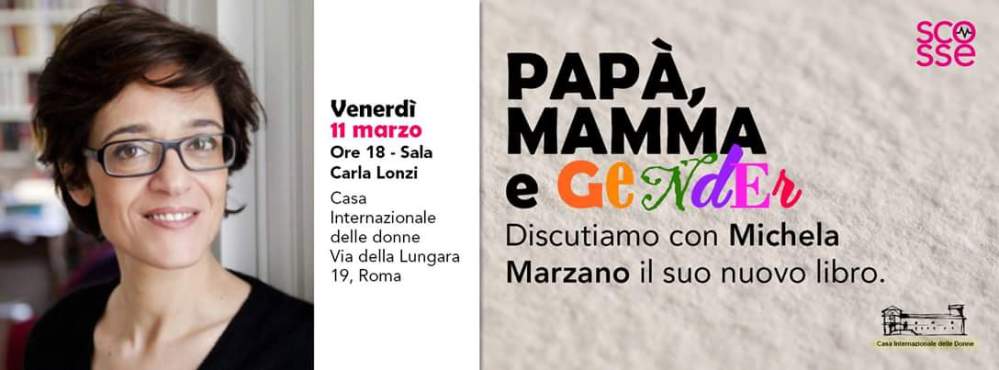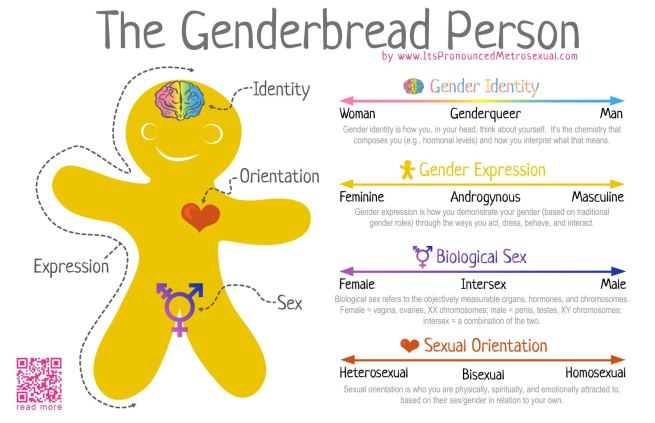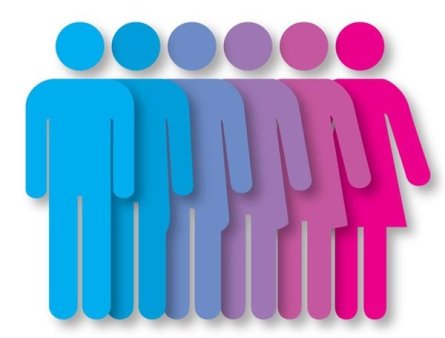
Read this to become intelligender
On March 11th, in Rome, the philosopher Michela Marzano presented her new book with three goals: putting an end to the fear of ‘gender’ in Italian society, deconstructing gender stereotypes, and making people understand that there is not one, single type of family
Born in 1970 in Rome, Michela Marzano is ordinary professor of philosophy in Paris, at Paris Descartes University. She is the author of many essays and articles dealing with moral and political philosophy. Moreover, she writes for the newspaper “La Repubblica” and she is currently deputy of the Italian Democratic Party. Within the Italian Parliament, she always distinguished herself for her constant activism in favor of egalitarian marriage and against homo-transphobia. On March 11th, at the Casa Internazionale delle Donne, the philosopher held a conference to talk about her new book titled “Papà, Mamma e Gender” (Dad, Mom and Gender), which deals with the general confusion characterizing Italian society around the word “gender”. Furthermore, during the conference she reflected on the current, political situation of the country.

(See: http://www.casainternazionaledelledonne.org/index.php/it/home and https://it.wikipedia.org/wiki/Michela_Marzano)
In Italy, the fear of the term “gender” has caused a living hell. In the last few years, several videos started circulating throughout the web, creating proper phenomena of terror. According to these videos, promoted by several Catholic associations such as “ProVita” and “Manif Pour Tous Italia”, Italian families are told that the government was forced to introduce sex education in schools. Such an education is based on the so-called “gender theory”, which teaches children to choose between being a man or a woman, to change sex whenever they want, and to have sex or masturbation immediately. Therefore, children would be exposed to these dangerous teachings from elementary school. As a consequence, panic spread within families, since this ‘gender monster’ undermines the stability of traditional families. Indeed, the video created by ProVita asks: “do you really want this for your children? NO! No to the gender theory in schools!”
Father: "What happened?" Mother: "He's shocked. At school there was a sex education lesson, based on the gender theory"
(See: http://www.notizieprovita.it/missione/ and http://www.lamanifpourtous.it/sitehome/)
Actually, all these information were made up. This is the starting point of Michela Marzano’s new book. Her will is to eliminate confusion around the concept of ‘gender’. Such a confusion has been generated by the emergence of anti-gender movements in order to go against the “DDL Cirinnà”. The fact that the English word “gender” is used, when there is the equivalent word “genere” in Italian language, is symptomatic. In fact, Marzano explains that the real engine of the anti-gender offensive is the terrible homophobia of this country. Gender ideology and gender theory don’t exist. There is a multiplicity of gender studies, instead. The philosopher wrote “Papà, Mamma e Gender” to give tools to teachers and parents, who have to educate kids on diversity instead of reinforcing stereotypes. Michela Marzano carries out a deep analysis of the dangerous abyss in which Italy finds itself. As she explained at the conference, in Italy there is lack of information or, even worse, huge misinformation. Since the best way to overcome fear and confusion is getting informed, parents and teachers have thus to understand the difference between “sex”, “gender” and “sexual orientation”.

Sex is the totality of the biological, genetic and physiological features allowing us to distinguish the man’s body from the woman’s body. However, the anatomical differences between female sex and male sex don’t imply that we behave or feel in a certain way.
When we talk of gender, we refer to something that gets added to the individual. Nevertheless, there is the need to make a distinction between gender identity and gender stereotypes. Gender identity is the deep, early and long-lasting feeling making each individual feel a woman or a man. In other words, gender identity is the deep perception of belonging to either the female gender or the male gender. Then, there are gender stereotypes, which are another thing. Regardless of how we feel, we often believe we have to behave in a certain way. That’s why we often hear the phrases “this is not a female thing!”, “this is not a male thing!”. Children are thus often told to do things that match their sex, regardless of how they might feel within themselves. Therefore, a boy who loves classical dance is a ‘sissy’ and a girl who loves soccer is a ‘tomboy’. Such stereotypes are very detrimental for kids, because they limit children’s freedom of expression. That’s why the philosopher Marzano invites schools and families to start deconstructing them, because if a little boy wears pink clothes it doesn’t mean he has identity problems. So if we don’t teach children that it’s legitimate for a little girl to like blue and play soccer and it’s legitimate for a little boy to like pink and play classical dance, we create huge problems in their minds.
Sexual orientation is simply about being emotionally and/or sexually attracted to another person. However, it’s important to highlight that it’s not something fluid and that, even though it’s part of our way of being, it’s not a choice. That being said, we talk of ‘heterosexuality’ when we are attracted to someone of the opposite sex; we talk of ‘homosexuality’ when we are attracted to someone of the same sex. However, being attracted to same-sex people doesn’t mean having uncertainties regarding who we are. Moreover, it’s fundamental to underline that there isn’t a cause-and-effect link between gender identity and sexual orientation. Namely, gender identity doesn’t imply a specific sexual orientation.

Michela Marzano asserts that if there are problems at school, it’s because there are young men and young women who feel ‘wrong’ because they don’t correspond to society’s gender stereotypes. Sex education is not about what ProVita spread throughout the media. Introducing gender education and sex education in schools would prevent certain children from being marginalized, hurt and set aside just because they don’t match certain stereotypes. In other words, introducing sex education means opening children’s horizon, fighting sexist and homophobic stereotypes, and decreasing bullying. Since we get educated to the concept of equality, Marzano asked the audience: why should there be problems when we try to undermine gender stereotypes? Teaching little girls that it’s legitimate to be truck drivers means deconstructing the gender stereotype wanting women to be relegated within the house. Therefore, deconstructing stereotypes doesn’t mean deconstructing the concept of ‘man’ and ‘woman’. It would be a great step towards the progress of civilization, instead. As the philosopher said, progress develops when complexity gets integrated. And complexity comes from diversity. If we have a single outlook on world, we cannot perceive and understand diversity. As a consequence, differences shouldn’t become an argument justifying the dominant hierarchy, according to which heterosexuality is superior and homosexuality is inferior. Homosexuality is not inferior to heterosexuality. It’s just different; it’s another way of feeling and getting close to other people. For centuries societies repeatedly affirmed that heterosexuality is the norm, while homosexuality is a deviance. Marzano clearly explained that if we stay within this mechanism we cut off, we discard a huge piece of humanity. And since we are in a ‘scrap culture’, the important thing is to be inclusive and not discard.





Michela Marzano took the occasion to talk about the “DDL Cirinnà” in relation to her book. The philosopher refers to Cirinnà’s bill as the betrayal of the left-wing and as a law humiliating homosexual people. The “DDL Cirinnà” was a compromise, already. What passed at the Senate was the compromise of the compromise. According to her, the bill represents a step forward from a legal point of view, but a step back from a symbolic point of view. Why? Because homosexual people find themselves within the enclosure called “specific social formation”. The “maxiemendamento” was no longer linked to the Article 29 of the Italian Constitution, which talks of family, but to the Articles 2 and 3, which talk of individual rights. However, what the Italian LGBT community expected, for the sake of equality, wasn’t the recognition of individual rights, but the recognition of their unions as family. The removal of the obligation of fidelity is also another proof of Italy’s terrible homophobia. The duty of loyalty, within the Civil Code, is the ability to be helpful when the partner needs help, to be morally liable. Removing any reference to the Article 29, obligation of fidelity included, means believing that homosexuals are not capable of that deep, unique support characterizing heterosexual love, because their relationships are always temporary, fragile and promiscuous. In other words, it’s a way of claiming that homosexual love cannot exist. Such a stereotype must come to an end.
People opposing to rainbow families quote the Article 29 of the Italian Constitution, which affirms that “the Republic recognizes the rights of the family as a natural society founded on matrimony.” Nevertheless, Michela Marzano focuses on the oxymoron the sentence represents in itself. If ‘family’ is natural, it cannot be based on the artificiality of law. And if family is based on the artificiality of law it means it’s not that natural. Furthermore, to all the people claiming that children shouldn’t grow up in same-sex families because they deserve the right of maternity and paternity, the philosopher Marzano replies coherently by using psychoanalysis. According to psychoanalysis, motherhood means to take care, to avoid that life will fall into the empty place of nonsense. Instead, fatherhood means to allow the desire to get along with the law, to understand that we cannot have everything and be everything. It follows that maternity and paternity are roles that can be played by a man just as by a woman. It’s absolutely true that children deserve the right of maternity and paternity. However, motherhood and parenthood have nothing to do with biology. It’s not a chance that French language differentiates between “géniteur” and “parent”. The former is the biological parent, the latter is the mother/father. Therefore, to the Catholic associations saying that it’s important to be on the side of children, Marzano replies by pointing out that it’s fundamental to be on the side of ALL children.



In conclusion, the purposes of Marzano’s new book are noble and legitimate: to reopen dialogue, clarify things and, mostly, overcome gender stereotypes. When we are very young, it’s difficult to defend ourselves. That’s why there should be teachers and parents explaining that there’s nothing wrong with being different. Defining masculinity and femininity is useless and even detrimental, because it means cutting out those who don’t fit in the definition. Therefore, on the one hand, schools should be the first to deconstruct gender stereotypes, teaching kids that there are different ways to become men and women. On the other hand, families should teach children that the concept of ‘mother’ and ‘father’ transcends biological sex, that there are different families, and that love doesn’t belong to a stereotyped class. Deconstructing gender stereotypes means deconstructing the heterosexist, dominant mindset and contrasting any kind of discrimination – such as bullying. In fact, the philosopher reminded the audience of the 15 years old boy who, labelled as “fag” by his peers because he used to wear pink pants, committed suicide in 2012. With her inspiring attitude, modesty and clarity, Michela Marzano prompted people at the conference to cooperate in order to build a society based on equality, remembering that equality and identity are two different things: we are all equal in terms of values, dignity and rights, even though we are all different in terms of identity. What Italy has to achieve is equality in differences, through differences, and thanks to differences.
Heartfelt thanks, Michela.
(See: https://www.youtube.com/channel/UCP1FBsekgPDDlm3_ogZtuvA and https://marzanomichela.wordpress.com/)